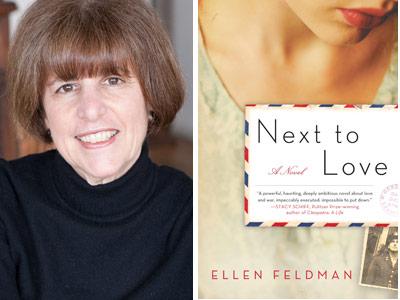War Wounds

Ellen Feldman’s “Next to Love” is an appealing and swiftly moving historical novel. The book leaves its mark through careful attention to detail along with a keen tracking of the emotional current that runs through the lives of the characters during and in the wake of World War II.
“Next to Love”
Ellen Feldman
Spiegel & Grau, $25
The story emerges chronologically, following three women — Babe, Grace, and Millie — from December of 1941 through to August of 1964. Three friends from the same small town, they send their men off to the war, each coping with different circumstances. Babe marries just before her husband ships out; Grace is left with a young child at home; Millie is pregnant, to give birth to a son her husband will never make it home to see.
So too, they cope with different interior spaces, different senses of self, different outlooks that at least in part determine the tone of their experiences of the war and of the losses associated with it.
Babe is a smart go-getter who is frustrated by the social constraints of being a woman and aware of the social realities of coming from the wrong side of the tracks in the small world of a small town. Her husband returns from the war physically wounded and psychologically deeply scarred. Grace is a tightly wound beauty who cracks under the pressure of holding it all together yet recovers and holds it together still. She loses her husband — her protector, her life — in the war and struggles mightily to find a place of comfort in the world. Millie is a sweetheart who lives in the shadow of her parents’ untimely deaths but retains an attitude toward life that is at once pragmatic and optimistic. Her husband dies in the war as well, but she quickly remarries and moves forward in a new relationship.
The sections of the book are divided to focus alternately on Babe, Grace, and Millie so that the life issues and events of each woman in a given chunk of time are compared and contrasted with those of the others. These women are friends and fellow travelers; their lives are intermingled. But they approach their challenges differently, carry their burdens ever so differently. They share and do not share experience. They share and do not share perspective.
Sketched out over the course of 20-odd years, the book is a sum of scenes artfully sewn together to form the landscape of how these three women fare as the wives of soldiers, then in the long aftermath of the war, and then in the territory beyond.
Societal trends and social issues of the period, especially those facing women, are tracked through the lens of the three main characters’ lives. For example, Babe goes to work during the war but must leave her job to give it over to a man when the soldiers come home. She struggles to find meaning as a homemaker and eventually finds fulfillment working in the civil rights movement.
Also mapping out the novel are the themes of love, sex, and loss. Ms. Feldman carries these themes along in the sweep of a broad historical sketch, and at times, moving as it does so quickly through time, the book feels a bit as if it’s trotting out examples. Yet Ms. Feldman more often manages to dwell in specificity, exploring love, sex, and loss in their deep organic relationships to her characters’ experiences.
Taking Babe again as an example, the scene of her first sexual encounter with her husband-to-be is tied to the impending loss of his departure for war, and later, when he returns, their sex life is warped by his loss of the embracing of life, a wage of his depleting experience in the war. Ms. Feldman’s line into Babe’s emotional connection to the surfacing and resurfacing of themes gives the novel an infusion of life.
Even within the demands of reaching and well-researched historical fiction, Ms. Feldman writes with insight into the feelings and struggles of her characters. As a work of faithfully wrought historical fiction, “Next to Love” feels accurate. As a novel chronicling love, loss, and the passage of time, it feels real.
—
Ellen Feldman’s previous books include, most recently, “Scottsboro.” She has a house in East Hampton.
Evan Harris is the author of “The Quit.” She lives in East Hampton with her husband and two sons.
